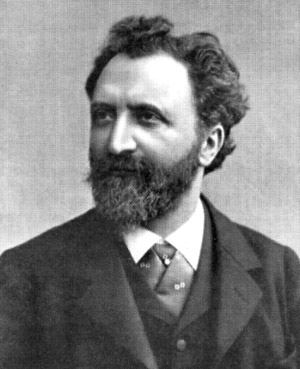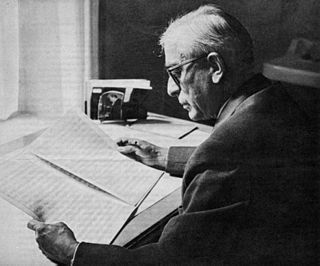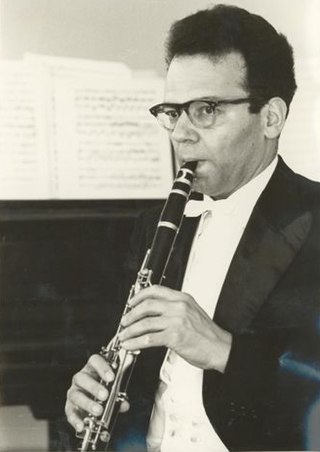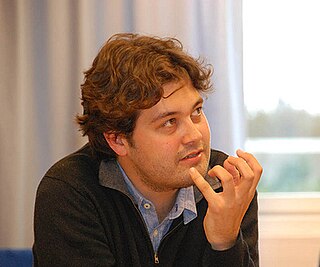Related Research Articles

The Piano Concerto No. 2 in B♭ major, Op. 83, by Johannes Brahms is separated by a gap of 22 years from his first piano concerto. Brahms began work on the piece in 1878 and completed it in 1881 while in Pressbaum near Vienna. It took him three years to work on this concerto, which indicates that he was always self-critical. He wrote to Clara Schumann: "I want to tell you that I have written a very small piano concerto with a very small and pretty scherzo." Ironically, he was describing a huge piece. This concerto is dedicated to his teacher, Eduard Marxsen. The public premiere of the concerto was given in Budapest on 9 November 1881, with Brahms as soloist and the Budapest Philharmonic Orchestra, and was an immediate success. He proceeded to perform the piece in many cities across Europe.

Henryk Bolesław Szeryng was a Polish-Mexican violinist.

Robert Fuchs was an Austrian composer and music teacher. As Professor of music theory at the Vienna Conservatory, Fuchs taught many notable composers, while he was himself a highly regarded composer in his lifetime.

Hans Huber was a Swiss composer. Between 1894 and 1918, he composed five operas. He also wrote a set of 24 Preludes and Fugues, Op. 100, for piano four-hands in all major and minor keys.

David Geringas is a Lithuanian cellist and conductor who studied under Mstislav Rostropovich. In 1970 he won the gold medal at the International Tchaikovsky Competition. He also plays the baryton, a rare instrument associated with music of Joseph Haydn.

Friedrich Gernsheim was a German composer, conductor and pianist.
Golani was born in Tel Aviv. Her father Yakov Gulnik was from Warsaw, and had lost his family in the Holocaust. Her mother Liza Goldstein was from Polish Galicia. Golani took up the violin at age 7, while her sister Bela learned the cello. Golani was a mathematics prodigy.

Philip Cipriani Hambly Potter was an English musician. He was a composer, pianist, conductor and teacher. After an early career as a performer and composer, he was a teacher in the Royal Academy of Music in London and was its principal from 1832 to 1859.

Volkmar Andreae was a Swiss conductor and composer.

Heinrich Picot de Peccaduc, Freiherr von Herzogenberg was an Austrian composer and conductor descended from a French aristocratic family.
Nikolai Petrovich Rakov, was a Soviet violinist, composer, conductor, and academic at the Moscow Conservatory where he had studied. He composed mostly instrumental works, for orchestra, chamber music and piano music, especially pedagogic works. In 1946, he received the Stalin Prize for his first violin concerto, which became known internationally.

Conrad Arthur Beck was a Swiss composer.

Yona Ettlinger was a clarinetist who played and taught in Israel, France and England. Ettlinger is considered a prominent classical clarinetist of his generation, and one of Israel's notable instrumentalists. His musicianship and unique sound influenced the art of clarinet playing in Israel and Europe in the second half of the 20th century. Many clarinet soloists and orchestra players of different countries were among his students.

Lawrence Power is a British violist, born 1977, noted both for solo performances and for chamber music with the Nash Ensemble and Leopold String Trio.

Fabian Müller is a Swiss composer.
Emil Bohnke was a German violist, composer and conductor active in Berlin.
Peter Bruns is a German cellist and university professor.
Richard Flury was a Swiss composer and conductor. His composition teachers were Hans Huber in Switzerland and Joseph Marx in Vienna. After studying abroad he returned to Switzerland, took a conducting course with Felix Weingartner in Basel, and then became a music teacher at his old school, the Solothurn Canton School, where he stayed for over 30 years, until 1961. He conducted the Solothurn City Orchestra from 1919 until 1949, also conducting various other local orchestras and choirs, playing in dance bands and teaching violin.
References
- 1 2 3 Palmer, Peter (January 1996). "Fritz Brun: a Swiss Symphonist". Tempo. New Series (195): 14–18. doi:10.1017/S0040298200004721. JSTOR 946456. S2CID 143958389.
- 1 2 3 4 5 6 7 "Fritz Brun - Brilliant Classics" (PDF).
- ↑ L. Paxton, John (1980). Calender of Creative Man. Macmillan Education UK. p. 412. ISBN 9781349025770.
- ↑ "Fritz Brun: Complete Orchestral Works".
- ↑ Hugh Reed, Peter (1993). American Record Guide - Volume 56, Issues 4-6. p. 228.
- ↑ Bithell, Jethro (2019). Germany: A Companion to German Studies. Routledge. ISBN 978-1-000-00841-8.
- ↑ Neue Zeitschrift für Musik - 1969 - Volume 78, Part 1 - Page 148 (translated: "In a perfect performance he offered Brahms' song of fate , whose works Fritz Brun always interprets with complete devotion.")
- ↑ A. Roth, Lee (2016). Ernst Kurth as Theorist and Analyst - Page 18. University of Pennsylvania Press. ISBN 978-1-5128-0626-7.
- 1 2 3 4 5 6 7 8 Lace, Ian (2004). "Review of Sterling Recording of Brun Symphony 3". MusicWeb International. Retrieved 2009-01-02.
- 1 2 3 4 5 6 7 8 9 10 11 12 13 14 15 See Brun Website Worklist (http://www.fritzbrun.ch/e/werkverzeichnis.html )
- 1 2 Guild biography page, subpage with description of symphonies 5 and 10.
- ↑ Guild biography page, Subpage describing symphony 9/Aus dem Buch Hiob recording